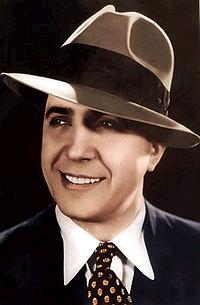Carlos Gardel
| |
|---|---|
 | |
| Born | |
| Died |
|
| Cause of death | plane crash |
| Nationality | Argentinian, Uruguayan (naturalized) |
| Occupation | singer, actor |
| Known for | Total hottie |
| Spouse(s) | Never married |
Charles Romuald Gardès, best known as Carlos Gardel, was a French/Argentine/Uruguayan actor of previously unknown origins who was best known for being awesome in tango. Also well-known for singing, in one of his last movies, "El día que me quieras," to which Roberto Carlos has lately forgotten the lyrics.
Early life[edit | edit source]
Nobody knows for sure if Carlos Gardel was born in Toulouse, France in 1890 or in Tacuarembó, Uruguay in 1887, because he would say both of these things, sometimes in the same sentence. What is definitely known is that he was illegitimately born, and the day was 11 December. His mom was an unmarried laundress named Berta Gardès.
Since 1893, Gardel had lived in Argentina, and got naturalized for Argentina and Uruguay in 1923. Whenever anyone asked him about his origins, he would give some rather creative answers, which included (and I am not kidding):
- "I was born in Buenos Aires, Argentina, when I was two years old."
- "I consider myself Argentine, but my soul is Uruguayan."
And so, even now, nobody knows where or when he was born. Until they finally found his birth certificate (see below).
Career[edit | edit source]
Gardel started out singing in bars and at parties. Nobody really cared, until like, 1917, when he did a tango called Tal vez soy francés (Maybe I'm French). It was a major success, and everyone wanted to be his girlfriend, I guess. He did have a sexy voice, you know.
And then he went all over Latin America and the fangirls were just swarming. Do they still care? Oh yeah, definitely. Those Elderly Fangirls are even older than the oldest of Roberto Carlos' Elderly Fangirls. They are so old, in fact, that they are all dead and their granddaughters are the Elderly Fangirls.
In the night of 10 or 11 December, 1915, supposedly, Gardel was shot in a nightclub by some guy named Guevara. Nobody knows if this guy was the father or uncle of Che Guevara, or what. Nobody cares, because nobody even knows if this incident ever happened at all.
His greatest contribution to the history of Latin American music was in working with the Brazilian songwriter Alfredo Le Pera, and in one of his last movies, El día que me quieras, he sang a song of the same name. It was the last scene, I guess. Anyway, a lot of people later made cover versions, most memorably, Roberto Carlos in 1974. Pity he can't remember it anymore.
Personal life[edit | edit source]
Gardel was never married, but many women dated him. None of them, as far as anyone knows, was a stupid, ugly fangirl. One of the better-known girlfriends, Isabel Martínez del Valle, wanted to marry him, but for some reason, he didn't want to. Gardel tried many times to break up with her, but they would always get back together. Isabel never really accepted that their relationship was finished.
Six days before he died, Gardel was asked some personal questions:
- Who was your first love? Every time I love somebody, that's my first love.
- What kind of women do you like? I like Latinas, because they are the same race as me, and they understand me better.
- Do you support divorce? Because of my occupation, I don't support marriage.
- What's your favorite color? What kind of question is that?
Another girlfriend, the actress Mona Maris, often said she had been his girlfriend, but even this could not be confirmed, because she was the only one who said anything about it. And frankly nobody cares, because she eventually annoyed the crap out of anyone who asked.
Death[edit | edit source]
On 24 June 1935, Gardel, Alfredo Le Pera, and some other people were in a plane, and like, the pilot must have been really stupid, because they all crashed into another, identical plane in Medellín, Colombia. Eighteen people died, including Gardel and Le Pera. There were only three survivors, but nobody cares who they were.
After Gardel died, the fangirls (who were not elderly at the time) became extremely distraught, and the newspapers reported many fangirl suicides (just kidding). Nowadays, Argentines are in the habit of saying that "every day Gardel sings better," which doesn't even make sense because he is dead.
In his will, his mom was his sole heir.
Controversy about his origins[edit | edit source]
If Carlos Gardel was born in Toulose, France in 1890, then Berta Gardès really was his mom, and they went to Uruguay because there was a gold rush. However, if he was born in Uruguay in 1887, then Berta Gardès was not his mom, but merely adopted him, and his real mom was a thirteen year old child who got fucked by her own brother-in-law. Ewww. Don't ask me how this makes sense, because I don't know.
When he got naturalized in Uruguay, and then Argentina, Gardel said he was born in Uruguay. Anyone who thinks he was born in France says this was a lie.
Despite everything, every 24 June, people in Uruguay remember Gardel's death.
WTF?[edit | edit source]
Well, what do you know. It turns out that in 2012, somebody found Gardel's birth certificate. And (we are seriously NOT making this up) it says that he was born in Toulouse, France, in 1890. The story goes, supposedly Gardel lied about his age and his country when he got naturalized, because during WWI, France was drafting, but since Gardel didn't want to be in the war, he pretended he wasn't born in France.
That made a lot of sense. But it's the truth.
“Este...could somebody remind me what comes next?”
– Roberto Carlos on forgetting "El día que me quieras"
El día que me quieras (original 1935 version)[edit | edit source]
LOLOLOLOL[edit | edit source]
This one is a little bit shorter, likely on purpose; one verse has been deleted.


